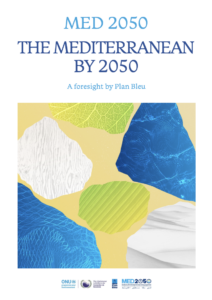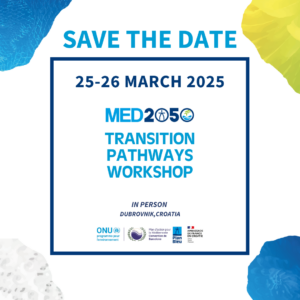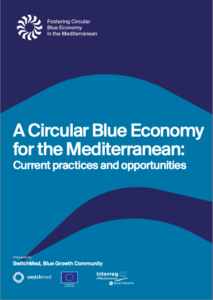The Blue Growth Community and SwitchMed officially launch the report “A Circular Blue Economy for the Mediterranean: Current Practices and Opportunities”.
The Blue Growth Community and the SwitchMed programme are pleased to announce the official publication of the report “A Circular Blue Economy for the Mediterranean: Current Practices and Opportunities”. This work is the result of a joint initiative of the two projects. More specifically, two entities focused their effort on the production of this report: the Intermediterranean Commission of the Conference of Peripheral Maritime Regions (IMC-CPMR), as partner of the Blue Growth Community, and MedWaves, the United Nations Environment Programme Mediterranean Action Plan (UNEP/MAP) Regional Activity Centre for Sustainable Consumption and Production (formerly known as SCP/RAC), with the contribution of Plan Bleu.
This objective is part of the capitalisation activities of the Blue Growth Community project, as it aims to integrate the tools and knowledge developed by the thematic projects of the Blue Growth Community.
The report was officially presented in Barcelona on 10 May 2022, on the occasion of the conference “Fostering Circular Blue Economy in the Mediterranean”. Now, both projects intend to disseminate this public report as much as possible in order to maximise its capitalisation potential for the future of the blue circular economy.
As far as the methodology is concerned, the report researched the state of the art of circular economy in some relevant sectors of the blue economy. he report is therefore organised by sector, which makes it easier for the reader interested in one given field to retrieve specific information. The report also allows a cross-sectorial analysis and an opportunity to compare the advancement of circular economy practices in various sectors. Each category provides case studies and concrete examples of circular economy already implemented in Europe and beyond.
The sectors studied in the report are the following:
– Fisheries and aquaculture
– Port systems
– Shipbuilding and ship repair
– Marinas
– Recreational boating and yachting
It is worth mentioning that the sectors related to the exploitation of marine non-living resources were not included in the report, since these sectors are highly unsustainable.
The blue sectors are studied in the light of 7 fields of action of the circular economy principles, namely:
– Eco-design
– Repair
– Re-use
– Reduce
– Upcycle
– Recycle
– Digitalisation as an enabler of circular economy
Moreover, the report provides in its conclusions an analysis of the challenges hindering the advancement of circular economy as well as solutions and recommendations to tackle these obstacles. In particular, the report offers recommendations in the following fields:
– Policy & governance
– Industrial development
– Business models
– Economy & finance
– Know-how, awareness & skills
The final version of the report is available here.













